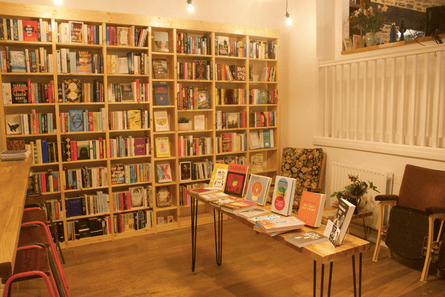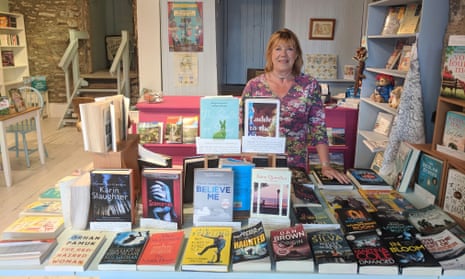The litany of bookshops that have disappeared from the UK’s high streets over the last two decades is long and sobering: chains such as Ottakars, Books etc, Dillons and Borders, and more than 1,000 independents. But over the past two years, indies have been quietly flourishing, with official figures from the Booksellers Association revealing a growth in numbers for the second year in a row.
Before 2017, the number in the UK and Ireland had declined every year since 1995, when there were 1,894 independent bookshops. A low of just 867 shops was reached in 2016, but 2017 marked a tiny turnaround: then, the total number in the UK and Ireland increased by just one, to reach 868. At the time, the BA predicted that booksellers’ fortunes were reversing. Now, its latest membership numbers confirm it: in 2018, the number of independents rose by 15 to 883. New stores range from Category Is Books in Glasgow – the second LGBTQ-dedicated bookshop in the UK – to the gloriously named Stripey Badger Bookshop in the Yorkshire Dales, and Lost in Books in Cornwall.
“Independent bookshops are important because we’re a refuge, and we’re dead against everything becoming the same,” says Daniel Ross from Storysmith, which he opened with his wife Emily in south Bristol in October. “We decided to open because we believe in bookselling as an essential function of a community, and real bookshops that inspire a lifelong love of reading.”
He said the store had received “an incredibly warm welcome” from locals, who had no independent bookshops in the area before: “So many people have come in and told us that it’s exactly what the area needed. They all put their money where their mouths were in the run-up to Christmas and we had a very encouraging month of sales, better than we’d been anticipating.” Storysmith is not alone; in a separate BA survey, 63.5% of booksellers reported that customer numbers rose this Christmas compared with 2017.

Last summer, Sarah Brook and her husband Peter left behind corporate jobs to open BrOOK’s, a fully licensed bookshop in Pinner, Middlesex, after finding inspiration in a “champagne book bar” they came across on an American road trip. Like Daniel, Sarah is feeling positive. “It has been very successful so far. The local community loves having a bookshop and Christmas saw huge gift sales. It’s an inclusive environment and lots of people come and have a drink on their own and browse the books,” she says. “Indies are important because they choose their own stock which can adapt to the local community. They offer a personal service and treat each customer as an individual.”
Amanda Davidge of Lost in Books, opened last summer, agrees. “I think there is a definite desire by locals to support local businesses as a reaction to the big online suppliers,” she says. “We have to work hard to make sure we can now keep the momentum going … I think it is important to keep small town communities alive by providing shops that locals want and also a hub for people to meet and to encourage reading.”
Many of the UK’s newest independents are completely new to the trade, drawn to bookselling because they see the need in areas without a bookshop. Sarah Brook, previously an HR director, says it has always been her dream: “When we opened, a friend of mine said, ‘I can’t believe you’ve actually gone and done it!’”
Elaine Sperber, who opened The Bookmark in Stockbridge High Street in Hampshire in April 2017, has lived in the area for 14 years “and was amazed that there wasn’t, and never had been, a bookshop in this lovely town”. Previously a television producer, she’d hoped to one day run a bookshop for a long time: “Since we’ve been there, so many customers from near and far have said how happy they are to have a small, curated, independent place where they can chat, browse and buy.”
The new independents are original and innovative: at Vinyl Fiction in Manchester, Sarah Pregnall runs a spoken word event each month where writers can share their work and collaborate; at Storysmith, Ross goes an extra mile to encourage reading in his community.
“Just a few weeks ago, we were approached by a local primary school who’d won a grant to restock the books in their classrooms, so we made a big deal of it – we got the kids into the shop, made them all hot chocolate, let them pick the books they wanted and then we delivered them the following week. It was chaos, but everyone loved it,” he says. “Some of them had never been in a bookshop before, and now we know they’ve started their reading journey in a really positive way.”
With other new stores including Max Minerva’s Marvellous Books in Bristol, The Snug Bookshop in Bridgwater, Somerset and Top Hat and Tales in Faversham, Kent, Meryl Halls, managing director of the BA, said it was “extremely encouraging to see independent bookshops succeeding in 2018, demonstrating the creativity and entrepreneurship of booksellers in the face of difficult challenges”.
But Halls is clear that booksellers were still “facing an increasingly challenging landscape across the UK and Ireland”. Challenges she cites include unequal business rates burdening physical bookshops – last year, the BA complained to the Treasury that Waterstones in Bedford pays 16 times more in business rates per square foot than the nearby Amazon distribution centre – as well as “unfair” competition from online retailers, and uncertainty caused by Brexit. She called on the government to “take the steps needed to protect the future of bookshops and their high streets, considering the concerns of retailers and booksellers so they can both flourish”.
